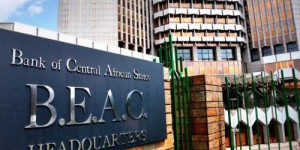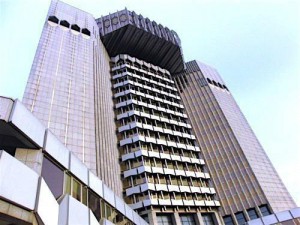
Between 2014 and 2017, the six CEMAC countries cut down public expenditure by FCfa 4,000 billion
Worth an estimated FCfa 7,000 billion in 2014, the spending carried out by the six countries in the CEMAC zone, gathering Cameroon, Congo, Gabon, Equatorial Guinea, Chad and the Central African Republic, peaks at roughly FCfa 3,000 billion in 2017, reveals BEAC, the issuing institution of the member States in this community.
This drastic reduction in public spending in the CEMAC zone (up to FCfa 4,000 billion in total), as analysed by the central bank, is the result of budgetary adjustment measures implemented in the States, or ordered by BEAC, since commodity prices started dropping (including oil, which five countries out of six are produce); a difficult economic situation which deprives the CEMAC States from important budget revenues.
As an example, BEAC decided, during the 22 May 2017 session of the Committee on Monetary Policy, to lower by 20% the refinancing goals of Chad and Equatorial Guinea; and by 10% those of the other States, provided that some developments take place with regards to their operational assets. This austerity measure, we learned, was meant to prevent injecting more liquidity in the economic system of the States, to avoid digging further into the foreign currency reserves which have greatly dropped since 2015.
“Generally speaking, when you have easing policies which allow you to inject more liquidity in the economy, what happens most often is that this money goes abroad, either because it is invested (the major contracts are generally won by foreign companies, Ed.), or because there is an increase in imports”, explains Abbas Mahamat Tolli, Governor of BEAC.
At the local level, through various mechanisms of budgetary adjustment, the CEMAC States have considerably reduced their expenditure. In Gabon, for example, investment spending planned in the 2017 budget of the State have dropped by FCfa 170,6 billion, compared to 2016. In Congo, the estimated State expenditure peaks at FCfa 2,107 billion in 2017, largely below the FCfa 2,608 billion mark in 2016 (-FCfa 500 billion).
In Cameroon, a country presented as the engine of CEMAC, the government announced during a press conference, in July, having implemented reforms which will lead, at the end of the year, to “a reduction of FCfa 100 billion in the operating expenditure” planned for the 2017 budget. The noose particularly tightened, we learned, on purchases of vehicles for the administration, fuel expenses and daily sustenance allowances for civil servants and other State agents.
Brice R. Mbodiam
GABAC raises alarm on risks linked to prepaid cards in CEMAC zone
In its August 2017 report on the "the new means of payment", the Action Group against money laundering in Central Africa (Groupe d’Action contre le Blanchiment d’Argent en Afrique Centrale - GABAC), has raised the alarm on the risks linked to prepaid cards in the CEMAC zone (Cameroon, Central Africa, Congo, Gabon, Equatorial Guinea, Chad).
The first of these risks, according to GABAC, is linked to the anonymity of the bearers. "These prepaid cards can be registered or anonymous depending on the options. (...) However without formal identification, the reporting institution or distributor is unable to determine the identity of the bearer and the origin of the funds used for the purchase of the card and its top up", writes the Action Group.
The second risk, concerns the non-respect of the Central Bank statutory limits. Because, top-up limits, withdrawal, payment, transfer or by transaction, suggests that the availability of prepaid cards has been diverted from its objective of financial inclusion and can lead to all sorts of abuses. "Absence of a mechanism of centralisation of information on the transactions of prepaid cards, a client whether a bank account holder or not can, while respecting the regulatory limits defined by each of the banks, gets around the limits and proceeds with repeating recharges in as many banks of choice in the country of residence and in the sub-region", we read in the report.
The last challenge, still according to GABAC, is linked to the laundering of tax and customs products. And with reason, like debit cards, prepaid cards allow economic operators to not only get around Community regulations in exchange matters, but also, to proceed in the reduction of values declared at customs and thus the associated duties and taxes. The profits fraudulently acquired are then invested "in various sectors (real estate, large scale agricultural projects, distribution of petroleum products...)", reveals GABAC.
Sylvain Andzongo
Cameroonian Sotrabus becomes first vehicle assembly unit in Central Africa
Since 2015, Cameroon in particular, and Central Africa in general, has its very first car assembly unit. This is the Société de transformation de bus (Sotrabus – Bus Transformation Company), specialised in the assembly of the transport bus with 45, 50 and 70 seats.
Located in the port area in Douala, the Cameroonian economic capital, this company has 150 employees , who work at putting together two buses per month. According to Albert Mbafe Konkou, Cameroonian polytechnic engineer who owns Sotrabus, the buses produced in the port area of Douala are tropicalised, as they are adapted to African roads; a continent Sotrabus is planning to take over in the mid term, starting with Central Africa.
According to the top management of Sotrabus, the company has already assembled over 20 buses since its creation, motor vehicles which are today the price of some local inter-urban transport companies (Finex, Trésor Voyages, or Princesse Voyage, etc.), operating in the Yaoundé-Douala-Bafoussam circuit.
Based on the popularity of these first buses made in Cameroon with transporters, the management of Sotrabus are considering increasing the production output from 2 buses to roughly 15 buses per month, reveals Albert Mbafe Konkou, a mechanical engineer and former sponsor of a transport company who was the first to take the step towards vehicle assembly in Cameroon.
Brice R. Mbodiam
Volume of irrecoverable debts fluctuates between 15 and 17% in the CEMAC zone, according to COBAC President
According to Abbas Mahamat Tolli, Governor of the central bank of the six CEMAC states, furthermore President of the Central African Banking Commission (Commission Bancaire de l’Afrique Centrale - COBAC), the envelope of irrecoverable debts in this Community area represents 15 to 17% of the overall volume of loans granted by the banks. The President of COBAC made this disclosure during the Justice-Bank forum that took place last 19 July in Ndjamena, the Chadian capital.
This meeting between judicial authorities, leaders of banks, microfinance institutions and regulatory authorities in the financial sector, aimed above all to "explain to the different magistrates the primacy of specific banking law over community legislation", confided Abbas Mahamat Tolli to the government journal.
"90% of litigation in the business world is linked to debt collection. Banks grant loans and receive cover of securities. When there is a default, there are legal complications which limit these credit establishments from realising these guarantees", points out the President of COBAC.
BRM
AfDB will release FCfa 3 billion for studies on project for extension of Cameroonian railway to Chad
The Cameroonian government and the African Development Bank group (AfDB) signed on 19 July 2017 in Yaoundé, a memorandum on the feasibility studies for the project to extend the Cameroonian railway to Chad, from the Cameroon Railways (Camrail) terminal in Ngaoundéré, the Adamawa regional capital, in northern Cameroon.
According to the Cameroonian Minister of Transport, Edgar Alain Mebe Ngo’o, this memorandum is a guidance document to set up the framework for the negotiations for the release of FCfa 3 billion by the AfDB to carry out the feasibility studies for the project to extend the Cameroonian railway to Chad.
The Cameroonian and Chadian governments have expressed their ambition to implement this comprehensive project on 3 June 2014 in the Chadian capital, with the signature of the bilateral agreement for the creation of the Cameroon-Chad Railway Commission, to expand the Cameroonian railway to Chad. This project was mentioned for the first time during the 22nd session of the extended Cameroon-Chad mixed Commission held in December 2010 in Yaoundé.
Under Article 6 of the agreement signed between the two countries on 3 June 2014, the contracting parties chose Bolloré Africa Logistics as technical partner on this project.
In practical terms, the role of Bolloré Africa Logistics, whose subsidiary in Cameroon (Camrail) holds the concession for the railway, will consist in, we learned from authorised sources, “supporting producing the studies; providing support for the preparation of project presentations for financial backers; preparing meetings with financial backers; contributing to the reflections and institutional and financial montages”.
Visiting Douala on 19 October 2015, Cyrille Bolloré, President of Bolloré Transport Logistics, had nonetheless expressed the ambition of the French logistics company to play a more important role in this project, by providing the funding necessary for its implementation. After resorting to AfDB to finance the feasibility studies, the Cameroonian and Chadian governments may very well remember this open invitation from the Bolloré group, to carry out the actual construction works.
Based on statistics from the Cameroonian customs, approximately FCfa 340 billion in Chadian goods transit through Cameroon every year, and are transported to Chad by road. The expansion of the Cameroonian railway to Chad is predominantly meant to facilitate transport for these goods, or even increase their volume and therefore increase the level of commercial exchanges between these two countries in the CEMAC zone.
Even though the agreement signed between Cameroon and Chad specifies that the two sides will later on agree on the route for this sub-regional railway, credible leaks indicate that the parties in this project have already discreetly agreed on the final route.
According to our sources, the route chosen for this railway will go from the Camrail terminal in Ngaoundéré (Cameroon) to Ndjamena, the Chadian capital, over 1,400 km, for an investment of FCfa 1,400 billion. This route excludes the second option considered by the project, which consisted in expanding the Cameroonian railway from Ngaoundéré (Cameroon) to Moundou (economic capital of Chad), to serve northern Chad.
Brice R. Mbodiam
BEAC: Cameroonian public securities still best rated, despite the strong competition from Gabon, Congo and CAR
On 5 July 2017, one of the most competitive selling sessions took place on the BEAC public securities market, pitting four of the six countries in the CEMAC, being Cameroon, Gabon and CAR, who attempted to raise a global envelope of FCfa 28 billion.
Once more, Cameroon, presented as the economic engine in the CEMAC zone, pulled through, with a subscription rate of 105%, for an average interest rate 3.1%. The other three countries had to settle with interest rates of 5%, to fill their respective coffers.
The interest rate given to investors by Gabon this past 5 July even reached 5.7%, for a subscription rate of 82% only. Which does not bode well for the future operations of this country on the capital market, despite the recent end of a structural adjustment program with the International Monetary Fund.
In other words, based on the above-mentioned results, Cameroon remains the main recipient of investors’ equity in the CEMAC zone, thanks in particular to a more diversified economy, which sets the scene for a now weakened resilience, against the crisis affecting the price of commodities such as oil.
BRM
Mobile Money: BEAC bans transactions by telecoms operator MTN Cameroun outside CEMAC zone
In a letter dated 19 June 2017, the Governor of the Bank of Central African States (BEAC), issuing institution for the six CEMAC States which are Cameroon, Gabon, Chad, CAR, Congo and Equatorial Guinea, advises the management teams of banks operating in this community, to “cease all operations for the transfer of funds abroad in the framework of electronic money activities, through (their) technical partners”.
According to Abbas Mahamat Tolli, this decision results from the fact that “mobile telephony operators may be, in reality, the true issuers of electronic money, in charge of managing it and carry out international transfers. Such actions would be in serious violation of the spirit and letter of the rules regulating not only the electronic money issuing activity, but also the regulation on currency exchanges”.
In Cameroon, this measure particularly concerns the local subsidiary of the South African telecoms operator MTN International, whose banking partner for Mobile Money solutions is the Cameroonian bank Afriland First Bank. Indeed, certainly motivated by the fierce competition observed on the Mobile Money market in the country, MTN Cameroun launched in January 2017, an offer enabling subscribers to this service, to transfer money to 25 African countries.
“No more queueing and long hours in transport. With MTN Mobile Money, you can now send money to 25 countries in Africa from your MTN Mobile Money account”, one could read in messages from the operator. Until this latest media appearance by the Governor of BEAC, this offer was valid for countries in CEMAC zone such as Gabon, Congo, but also for countries in West Africa such as Benin, Burkina Faso, Côte d’Ivoire, Guinea-Bissau, Mali, Niger, Nigeria, Senegal or Togo.
As a reminder, for about 2 years now, Mobile Money services have been expanding in Cameroon. At end 2016, the country officially had approximately 5.4 million subscribers to this service, including 2.6 million for MTN Cameroun, who attracted an additional 300,000 new customers on this market segment, during the period covering June to September 2016, as revealed by the financial statements published by this telecoms operator.
Brice R. Mbodiam
Faced with pressure from other countries, Cameroon’s indebtedness on the BEAC securities market increases
The Cameroonian Public Treasury is going back to the BEAC securities market this 14 June 2017, to attempt to raise FCfa 5 billion, through the issuance of fungible Treasury bonds with a maturity of 26 weeks.
Contrary to previous years, during which fundraising operations by the State of Cameroon always led to a rush of investors operating on this market, this new issuance of Cameroonian public securities could turn out to be a lot harder.
Indeed, in addition to subscription rates which moved from 600% a few years ago, to 200% or even 97% only (1 February 2017 issuance) since the beginning of the year, Cameroonian public securities are not as popular as in the past.
Proof of this, a compilation of various official press releases announcing the results of selling sessions reveal that the interest rates demanded by investors for Cameroonian public securities increased by approximately 1% during the 2nd quarter of 2017, now reaching 3.5% on average, against 2.5% only until 2016.
At the origin of this increase in the Cameroonian debt on the market of the Bank of Central African States, according to analysts, is the high demand in financing from other CEMAC countries.
Indeed, as main and sole operator on this market since its launch in 2011, Cameroon is now facing competition from other countries in the CEMAC such as Gabon, Chad and Equatorial Guinea.
Since the beginning of this year, these three oil Central African emirates, who are facing treasury tensions, due to the decrease in international oil prices (representing between 50 and 80% of public revenues in these countries), have become very active on the BEAC securities market, thereby reducing the flexibility of the Cameroonian Public Treasury.
In this situation, we should expect, at the end of 2017, a slight increase in the domestic debt of the country, due in part to higher interest expenses registered on the securities market, where the Cameroonian government is planning to raise a total of FCfa 300 million in 2017.
Brice R. Mbodiam
Cameroonian Public Treasury issues new securities worth FCfa 5 billion on BEAC market on 14 June
The Cameroonian Public Treasury will proceed, on 14 June 2017, with a new issuance of public securities on the market of the Bank of Central African States (BEAC), the issuing institution for the six member-States in the Central African Economic and Monetary Community, we officially learned.
This new issuance of Treasury bonds with a maturity of 26 weeks will be for a total of FCfa 5 billion, and is the last but one attempt to raise funds on this market in the 2nd quarter of 2017. The last operation, based on the official timetable sent to BEAC by the Ministry of Finance, will take place on 28 June, and the Cameroonian Public Treasury will once again attempt to raise FCfa 5 billion.
Incidentally, though the government has until now followed the timetable of operations on the BEAC market, where Treasury bonds - which are short term securities - are concerned; we must note that it abstained since the beginning of the year from issuing Treasury obligations (long term securities) as planned in the timetable provided to the Central Bank.
Indeed, the two operations planned in this category of securities for the 2nd quarter of 2017 were not carried out. They were scheduled to take place on 3 May (FCfa 5-10 billion) and 7 June 2017 (FCfa 10-15 billion), with respective maturity of 2 and 3 years.
BRM
In front of the vulnerability of bank treasuries in the CEMAC zone, BEAC put final touches to a system of emergency liquidity provision
The Central Bank of Central African States (BEAC), issuing institution of the six countries in the CEMAC which are Cameroon, Congo, Gabon, Chad, Equatorial Guinea and the Central African Republic, is currently putting the final touches to the implementation of an emergency liquidity provision system to banks in this community.
According to the Governor of BEAC, Chadian Abbas Mahamat Tolli, this system planned as part of the reform of the monetary policy of this central bank, is “motivated by the regional situation characterised by the vulnerability of the treasury of several banks, particularly in conjunction with the financial difficulties of these States”.
The system, explains the Governor of BEAC, will consist “in providing, in a discretionary and exceptional manner, liquidity to a solvent financial institution, but suffering from serious liquidity tensions which could result in a major financial risk for the sub-region”.
Though he specified that with the current ongoing process, the Central Bank of CEMAC States is more “in a logic of anticipation” and that “the practical terms and conditions of this system will be finalised by the end of the year” 2017, Abbas Mahamat Tolli however pointed out that the BEAC monetary policy Committee “could face any emergency occurring before the end of the year”.
Indeed, according to authorised sources, the treasury of several banks operating in the CEMAC zone is in a critical position, and could trigger the above-mentioned system before the end of the year. Severely affected by the drop in oil revenues, which represent between 25% and 85% of public revenues in five oil producing countries in the CEMAC (apart from the Central African Republic), the six States in this community rushed to the capital market in search of finding for their operations and public expenditure.
This is how banks in the zone, who generally have as their main commercial partners States and state companies, have been increasingly solicited. Either for important withdrawals of funds, direct loans, or indirect loans, particularly via the public securities market launched by BEAC in November 2011, and where banking institutions in the CEMAC zone are almost all approved as primary dealers (Spécialistes en Valeurs du Trésor - SVT).
As an example, since the launch of this securities market, the States have officially raised over FCfa 4,000 billion on this market. Which represents approximately 40% of the FCfa 9,827 billion in banking deposits registered in the CEMAC zone at end July 2016.
Brice R. Mbodiam
Mags frontpage
- Most read 7 days
- shared 1 month
- read 1 month







































